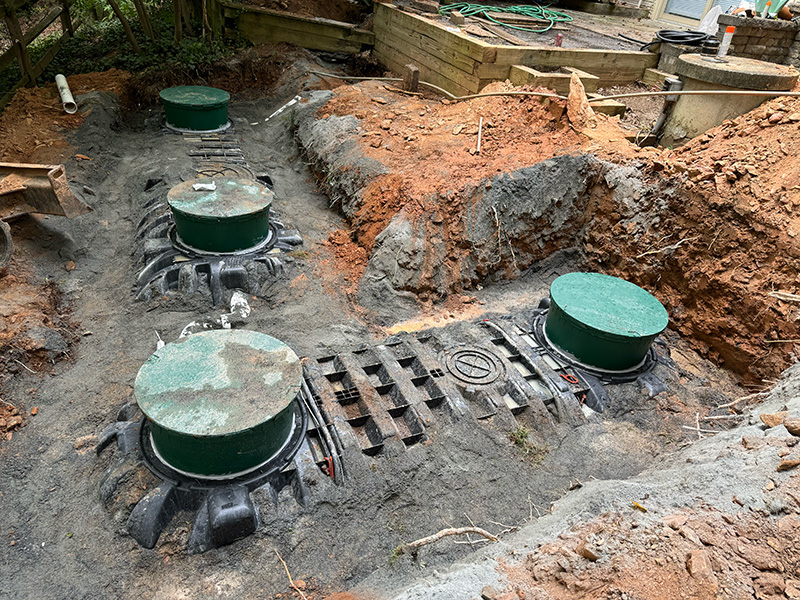Northern Virginia experiences a full range of seasons, from hot, humid summers to cold, snowy winters, often punctuated by heavy rainfall. While your septic system is designed to be robust, extreme weather conditions can significantly impact its performance. At Great Falls Septic Service, we want to help you understand these impacts and take proactive measures to protect your system, ensuring its longevity and your family’s comfort.
Understanding How Virginia Weather Affects Your Septic System
1. Heavy Rainfall and Flooding:
- Hydraulic Overload: Prolonged or intense rain, common in Virginia during spring and fall, saturates the ground around your drain field. When the soil is waterlogged, it can’t absorb the treated wastewater (effluent) from your septic tank. This leads to hydraulic overload, causing wastewater to back up into your home or pool in your yard.
- Soil Compaction: Over time, heavy rain can also compact the soil, reducing its ability to filter water effectively.
- Erosion: Intense downpours can cause erosion, potentially exposing or damaging buried pipes.
- Flood Damage: In severe floods, the septic tank can become inundated with groundwater, or even float out of the ground if it’s empty. Drain fields can be completely submerged, becoming inoperable until the water recedes and the soil dries.
2. Freezing Winter Temperatures:
- Frozen Pipes: While your septic tank is usually buried deep enough to avoid freezing, shallow pipes leading to or from the tank, or sections of the drain field near the surface, can freeze during extended periods of sub-freezing temperatures, especially in Northern Virginia.
- Reduced Bacterial Activity: Extremely cold temperatures can slow down the beneficial bacterial activity in your tank, making the system less efficient. However, the warmth of incoming wastewater typically prevents the tank itself from freezing solid.
- Snow as Insulation: Ironically, a good layer of snow can act as an insulator, protecting your system from deeper freezes.
3. Hot, Dry Summers:
- Increased Water Usage: During dry spells, homeowners might increase water use for irrigation or pool filling, which can strain the septic system if not managed carefully.
- Soil Shrinkage: Extremely dry conditions can sometimes cause the soil to shrink, potentially creating minor gaps around pipes, but this is less common for well-maintained systems.
Proactive Measures to Protect Your Septic System in Extreme Virginia Weather
Being prepared is the best defense for your septic investment:
- Before Heavy Rains/Flooding:
- Know Your System’s Location: Ensure you know precisely where your septic tank and drain field are located on your Virginia property.
- Divert All Water: Make sure all roof downspouts, sump pump discharge lines, and surface water drains are directed away from your septic system and drain field.
- Pre-emptive Pumping (Caution!): If a major flood is anticipated and your tank is due for pumping, consider having it pumped before the flood to reduce wastewater volume. However, never pump an empty tank in a flood-prone area, as it can float out of the ground.
- Reduce Water Use: Cut down on water consumption during and immediately after heavy rains to prevent overwhelming the system. Delay laundry, dishwashing, and long showers.
- During/After Flooding:
- DO NOT Use the System: If your septic system is submerged, do not use your toilets, showers, or drains. All wastewater will have nowhere to go and will back up into your home.
- Inspect After Water Recedes: Once floodwaters have completely receded, visually inspect the area around your tank and drain field for any visible damage like erosion or exposed pipes.
- Professional Inspection is Key: Call Great Falls Septic Service’s licensed septic professionals in Northern Virginia to inspect your system after a major flood. We can check for structural damage, assess the drain field’s condition, and ensure proper function before you resume normal water use.
- Before Winter Freezes:
- Insulate Exposed Pipes: If you have any septic pipes that are exposed (e.g., from a pump chamber), insulate them with straw, mulch, or insulation wrap to prevent freezing.
- Ensure Proper Drainage: Verify that all water runoff is directed away from your system to prevent ice formation over critical components.
- Fix Leaky Plumbing: Repair any leaky faucets or toilets inside your home. A continuous trickle of water can freeze in pipes.
- Consistent Water Use: Don’t let your septic system go dormant. Consistent, moderate water use helps keep temperatures in the tank stable.
Be Prepared: Your Septic System’s Best Defense Against Virginia’s Weather
Northern Virginia’s weather can be tough on septic systems, from heavy rains to freezing winters. But by understanding how these conditions affect your system and taking proactive steps, you can avoid costly failures and messy backups. If you’re ever worried about how the weather is impacting your system, or if you need a professional check after a big storm, don’t hesitate to call Great Falls Septic Service. We’re your local experts, here to make sure your Virginia home’s septic system stays reliable and efficient, all year round.


